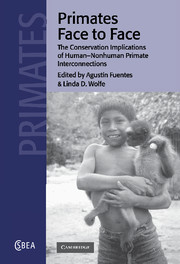Part 4 - Government actions, local economies and nonhuman primates
Published online by Cambridge University Press: 20 October 2009
Summary
National governments often become involved in controlling access to wildlife sanctuaries and reserves. In the first chapter in this section (Chapter 13), Ardith Eudey discusses conservation projects in Thailand and other nearby countries where local people are evicted or hired to act as guides. Eudey was a graduate student when she began her research in the Huai Kha Khaeng Wildlife Sanctuary in the Uthaithani province in Thailand. She found herself at a center of the discord between the ethnic hill folk and the sanctuary's officers from Bangkok. True to her identity as an anthropologist, she acted as a buffer between the government of Thailand and their desire to move the Hmong from the sanctuary to another village site. As vice-chair for Asia of the IUCN Species Survival Commission's Primate Specialist Group, she also expresses her concern with the situation in both Myanmar and Vietnam. She argues that conservationists should be sensitive to the needs of both the indigenous people and the local wildlife. She also presents the case that the best park rangers are often the local people because they are familiar with the forest. She argues, moreover, that it is more humane to employ indigenous people in their native areas than to move them to a new area that may be less suited to their needs.
- Type
- Chapter
- Information
- Primates Face to FaceThe Conservation Implications of Human-nonhuman Primate Interconnections, pp. 273 - 276Publisher: Cambridge University PressPrint publication year: 2002



